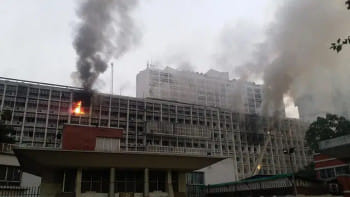Military ops bear all hallmarks of genocide

The United Nations special envoy on human rights in Myanmar has claimed that Aung San Suu Kyi could be complicit in the systematic persecution of Rohingyas, which bears all the hallmarks of genocide.
In an interview with Channel 4 News posted on the British broadcaster's website on Wednesday, Yanghee Lee said there were grounds for bringing Myanmar's de facto leader before an international tribunal for failing to intervene in the military's “clearance operation” in Rakhine State.
She also said she had personally been told that more mass graves were likely to be discovered in the country, though she did not offer details.
The UN envoy observed that the military's clearance operation, which has seen over 700,000 Rohingyas flee to Bangladesh, bears “all the hallmarks” of genocide.
Global condemnation has rained down on Myanmar since August 25 when a military crackdown on Rohingya insurgents began in response to an insurgent attack.
Civilian leader Aung San Suu Kyi has borne the brunt of the outcry and been stripped of a welter of honours from her days fighting for democracy under Myanmar's junta.
Asked about Suu Kyi's role, Lee said, “I think that she's either denying [what's happening], or she's really far removed.”
The state counsellor “can't be not accountable”, Lee said, adding that she believed Suu Kyi was guilty of “complicity or neglecting to do anything to halt this….”
She, however, thinks the chances of Suu Kyi actually appearing before some sort of tribunal were “very small”.
Myanmar is not a party to the International Criminal Court, and China's status as a permanent member of the UN Security Council meant it was unlikely that the body would declare the Myanmar military's actions against the Rohingya as genocide.
In December, the government of Myanmar informed Lee that she had been barred from returning to the country and that cooperation would be withdrawn for the duration of her tenure.
The Myanmar authorities had complained that Lee's reporting on the situation in Myanmar had been biased for about six months leading up to the ban.
Talking to the Channel 4, Lee said she'd received many death threats and was even warned of a planned assassination attempt.
In another development, Myanmar's army chief received a royal decoration from Thailand yesterday, despite accusations his security forces have carried out ethnic cleansing against Rohingyas.
Senior General Min Aung Hlaing controls the army and oversaw the "clearance operations" on Rohingya villages.
The military man was nominated for the award by Thailand's King Maha Vajiralongkorn on August 21, 2017 -- days before the crackdown -- "for support and service to Thailand's army", according to palace mouthpiece the Royal Gazette.
Min Aung Hlaing posted a photo to his official Facebook page of him smiling alongside his Thai counterpart as he received the "Knight Grand Cross First Class of the Most Exalted Order of the White Elephant" in Bangkok.
It was awarded "to show the long and close relations" between the two countries, the Royal Thai Armed Forces said in a statement.
But Matt Smith, of campaign group Fortify Rights, said Thailand should support calls for accountability and justice in neighbouring Myanmar rather than honouring its top military official.
"This is a man responsible for a military committing mass atrocities with complete impunity," he said, in reference to widespread allegations his forces raped and murdered Rohingya during the crackdown.
Junta-run Thailand defended the decision to decorate the powerful general.
"It's tradition to give a royal decoration to supreme commanders of foreign countries," Defence Ministry spokesman Lieutenant General Kongcheep Tantravanich said.
This week the US Ambassador to the United Nations Nikki Haley urged the Security Council to ensure Myanmar's military answers for its campaign against the Rohingya.
The army has said it did not target civilians and has only admitted to killing "terrorists".
Since winning elections in 2015, Suu Kyi's civilian government has been in a delicate power-sharing arrangement with Min Aung Hlaing.
The US embassy in Bangkok did not immediately comment on whether Min Aung Hlaing would visit military exercises held in Thailand this week, where Myanmar's participation as an observer has sparked criticism.
Thailand has remained close to Myanmar despite friction over the Rohingya crisis within the Association of Southeast Asian Nations, which follows a policy of not interfering in the affairs of other bloc members.
[From Channel 4, The Irrawaddy and AFP]


 For all latest news, follow The Daily Star's Google News channel.
For all latest news, follow The Daily Star's Google News channel. 



Comments